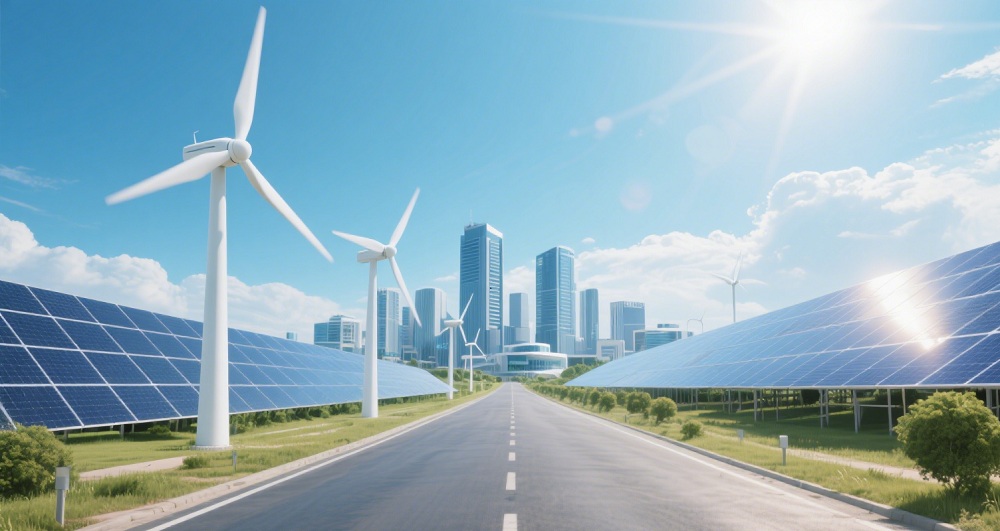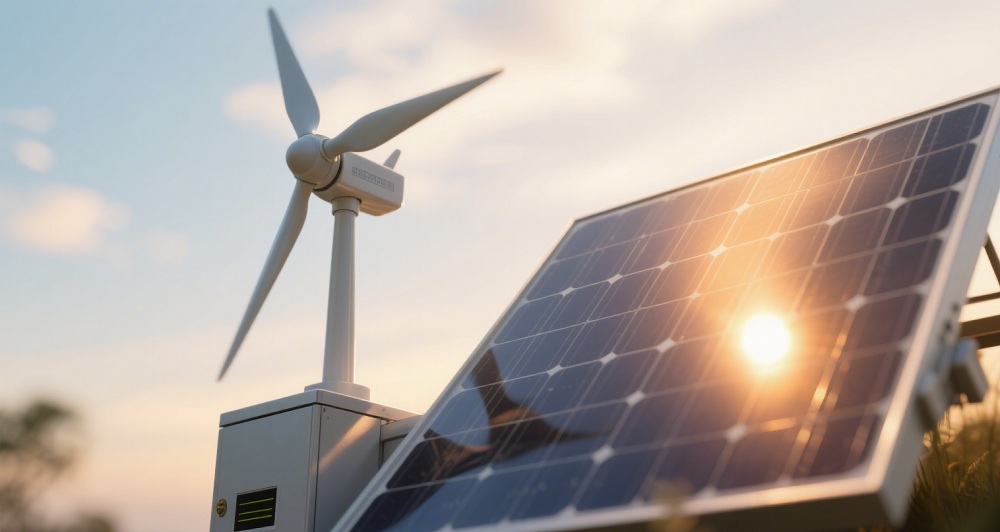Hybrid Energy Unlocking the Future of Sustainable Power
As the world increasingly focuses on sustainable and clean electricity, hybrid energy is becoming an effective approach to meet growing energy demands efficiently and in an environmentally responsible manner.
A hybrid energy system integrates multiple power sources—including solar, wind, and conventional generators—to provide a reliable, cost-effective, and eco-friendly supply of electricity.
These systems are capable of adapting to fluctuating demand and varying environmental conditions. They not only enhance energy security but also significantly reduce reliance on fossil fuels, supporting a transition toward a more sustainable energy future.
What is Hybrid Power?
Hybrid power refers to the generation of electricity using a combination of two or more energy sources. These sources typically include renewable technologies such as solar panels and wind turbines, along with conventional generators or grid connections.
A hybrid power system ensures that energy is consistently available, even when one source is intermittent. For instance, solar panels generate electricity during the day, while wind turbines may operate at night or during overcast periods.
By integrating different energy sources, a hybrid energy system balances supply and demand, maximizes efficiency, and minimizes the reliance on fossil fuels. This makes hybrid energy a compelling solution for both on-grid and off-grid applications, from urban microgrids to remote villages.
How Does a Hybrid Energy System Work?
Overview of System Operation
A hybrid energy system works through a carefully coordinated process that integrates multiple energy sources, storage technologies, and smart control systems. Solar panels convert sunlight into electricity, while wind turbines harness kinetic energy from the wind, and diesel or other conventional generators provide backup power when needed.
The intelligent control system continuously monitors energy production, consumption, and storage levels to ensure that the right energy source is used at the right time, optimizing efficiency and reliability.
Energy Storage and Reliability
Energy storage is a crucial component of a hybrid energy system. Batteries and other storage technologies store surplus electricity produced during periods of high renewable output. This stored energy can then be used during low production periods, ensuring a consistent and uninterrupted power supply.
The system automatically switches between stored energy, renewable generation, and conventional sources depending on demand and environmental conditions, maintaining optimal performance.
Energy Flow and Management
The system continuously manages the flow of electricity, prioritizing renewable sources while ensuring stability through conventional backups. The control system can forecast energy generation based on weather patterns and usage trends, dynamically adjusting operations to maximize efficiency.
This intelligent energy management allows hybrid power generation to adapt to fluctuating demands, prevent waste, and provide reliable electricity even in challenging conditions.
Maintenance and Monitoring
Regular monitoring and maintenance support the efficient operation of hybrid energy systems. The control system alerts operators to any irregularities or performance issues, enabling timely intervention.
Maintenance includes checking battery health, inspecting solar panels and wind turbines, and ensuring that backup generators are operational. Through proactive monitoring, hybrid systems maintain high efficiency and prolong the lifespan of components, further enhancing reliability.
Practical Applications of Hybrid Energy Systems
Remote and Off-Grid Communities
Hybrid energy systems are widely adopted across different industries and regions, providing crucial electricity access in remote areas. In communities without connection to the main power grid, villages can implement solar hybrid power systems and wind turbines to gain energy independence, reduce reliance on costly and polluting fuel, and support local development. These systems allow for essential services like healthcare, education, and small-scale industry to operate reliably.
Commercial and Industrial Use
Commercial and industrial facilities benefit significantly from hybrid power systems. By integrating solar panels, wind turbines, and other energy sources, businesses can lower electricity expenses, reduce their carbon footprint, and enhance sustainability credentials.
Hybrid systems also ensure that production processes remain uninterrupted during power fluctuations, providing both economic and operational advantages.
Island and Military Applications
Islands, which typically rely on imported diesel fuel at high costs, can implement hybrid wind solar power systems to reduce operational expenses and decrease environmental impact.
Similarly, military bases and disaster relief operations utilize hybrid systems to ensure a continuous, resilient, and portable power supply. These systems provide flexibility in remote or critical scenarios, enabling reliable operations even under challenging conditions.
Types of Hybrid Power
Solar-Diesel Hybrid Systems
Hybrid energy systems come in various configurations, each designed for specific operational needs. Solar-diesel hybrids combine solar panels with diesel generators to provide steady electricity while reducing fuel use, making them suitable for locations with limited grid access.
Wind-Solar Hybrid Systems
Wind-solar systems integrate wind turbines with solar panels, allowing the system to take advantage of different weather conditions and energy availability, ensuring more consistent power generation throughout the year.
Microgrid Hybrid Systems
Microgrid hybrid systems connect several energy sources to a local distribution network to optimize overall energy use and efficiency, offering a flexible solution for communities and facilities.
Battery-Based Hybrid Systems
Battery-based hybrids utilize advanced storage technologies to store surplus renewable energy, ensuring that electricity is available when generation is low, and improving overall system reliability.
Advantages and Disadvantages of Hybrid Systems
Understanding the advantages and disadvantages of hybrid systems helps stakeholders make informed decisions when considering implementation.
Advantages:
- Enhanced energy reliability and availability.
- Reduced fuel consumption and operational costs.
- Lower carbon emissions and environmental impact.
- Scalability to meet varying energy demands.
- Potential integration with smart grid technologies.
Disadvantages:
- Higher upfront costs compared to single-source systems.
- Complex system design and maintenance requirements.
- Dependence on weather conditions for renewable sources.
- Potential for technology integration challenges.
Hybrid Renewable Energy
Hybrid renewable energy refers to advanced energy systems that combine multiple renewable sources, such as solar and wind, and often incorporate battery storage for improved stability. These systems are designed to provide consistent and reliable electricity, even when individual sources fluctuate due to weather or time of day.
By integrating various renewable technologies, hybrid renewable energy systems offer a sustainable, low-carbon alternative to conventional power, reduce dependence on fossil fuels, and enhance overall energy resilience for communities, businesses, and off-grid applications.
Benefits of Renewable Energy
The adoption of renewable energy within hybrid power systems brings numerous advantages. By integrating renewables, these systems help reduce greenhouse gas emissions and diversify the energy mix, enhancing overall energy security.
They contribute to lowering long-term operational costs and promote sustainable development by providing a cleaner, more resilient energy solution for a variety of applications.
5 Major Advantages of a Hybrid Energy System (Solar + Wind)
Complementary Power Generation
A hybrid energy system that combines solar and wind sources provides electricity throughout the day and night. Solar and wind complement each other, reducing periods without power and increasing overall energy availability. This integration ensures a smoother and more predictable energy supply.
Reduced Fuel Dependence and Cost Savings
The complementary generation decreases reliance on diesel or other fossil fuels. This not only saves fuel but also reduces operational costs over time, making hybrid systems economically advantageous for both communities and businesses.
Environmental Benefits
Such systems help minimize emissions and lessen the ecological footprint, supporting environmental sustainability goals. By utilizing renewable sources alongside conventional generation, hybrid systems contribute to cleaner energy production.
Enhanced Resilience and Reliability
By using multiple energy inputs, hybrid systems improve overall energy resilience and reliability. This ensures a consistent and stable electricity supply that can meet the needs of communities, businesses, and critical applications, even under varying environmental conditions.
What is the Cost of a Hybrid System?
Initial Investment
The cost of a hybrid energy system varies widely depending on the system’s size, components, and installation location. Larger systems with more extensive solar panels or wind turbines naturally require higher initial investment.
The type and capacity of battery storage also influence overall costs, as advanced energy storage solutions can be more expensive but provide greater reliability and a longer lifespan.
Integration and Operational Costs
Integration with existing infrastructure, including grid connections or backup generators, can add to upfront expenses. Ongoing maintenance and operational considerations must also be factored into the total cost.
Despite the higher initial investment compared to conventional single-source systems, hybrid energy systems often prove cost-effective over time, offering long-term savings on fuel, reducing dependency on conventional energy sources, and lowering environmental impact, making them a sustainable financial choice for many applications.
Conclusion
Hybrid energy signifies a transformative approach to modern power generation, blending multiple energy sources to achieve efficiency, reliability, and sustainability. These systems demonstrate the potential to reduce environmental impact, lower operational costs, and enhance energy security across diverse applications.
By integrating renewable and conventional sources, hybrid solutions offer a practical pathway toward a cleaner, more resilient energy future, supporting both communities and industries in adapting to evolving energy demands.


